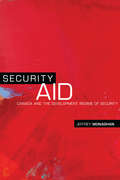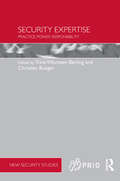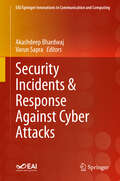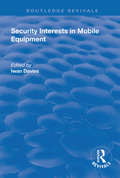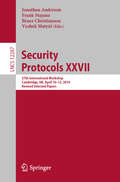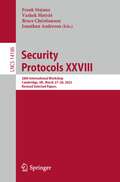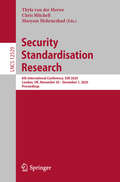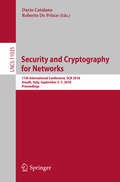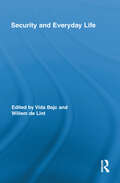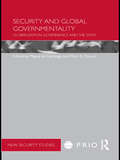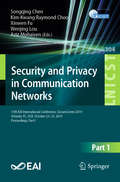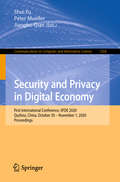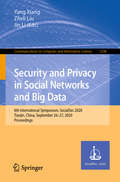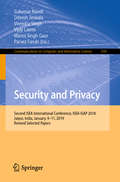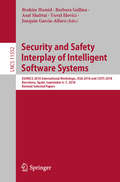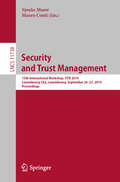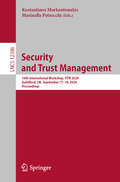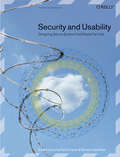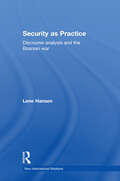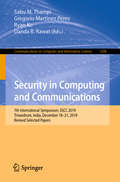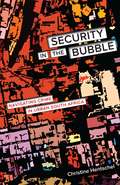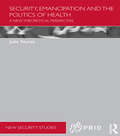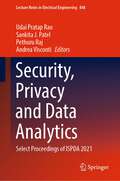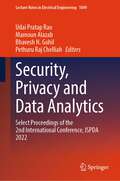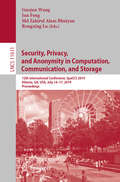- Table View
- List View
Security Aid: Canada and the Development Regime of Security
by Jeffrey MonaghanCanada is actively involved through various agencies in the domestic affairs of countries in the Global South. Over time, these practices – rationalized as a form of humanitarian assistance − have become increasingly focused on enhancing regimes of surveillance, policing, prisons, border control, and security governance. Drawing on an array of previously classified materials and interviews with security experts, Security Aid presents a critical analysis of the securitization of humanitarian aid. Jeffrey Monaghan demonstrates that, while Canadian humanitarian assistance may be framed around altruistic ideals, these ideals are subordinate to two overlapping objectives: the advancement of Canada’s strategic interests and the development of security states in the “underdeveloped” world. Through case studies of the major aid programs in Haiti, Libya, and Southeast Asia, Security Aid provides a comprehensive analysis and reinterpretation of Canada’s foreign policy agenda and its role in global affairs.
Security Expertise: Practice, Power, Responsibility (PRIO New Security Studies)
by Christian Bueger Trine Villumsen BerlingThis volume brings together scholars from different fields to explore the power, consequences and everyday practices of security expertise. Expertise mediates between different forms of knowledge: scientific and technological, legal, economic and political knowledge. This book offers the first systematic study of security expertise and opens up a productive dialogue between science and technology studies and security studies to investigate the character and consequences of this expertise. In security theory, the study of expertise is crucial to understanding whose knowledge informs security making and to reflect on the impact and responsibility of security analysis. In science and technology studies, the study of security politics adds a challenging new case to the agenda of research on expertise and policy. The contributors investigate cases such as academic security studies, security think tanks, the collaboration between science, anthropology and the military, transnational terrorism, and the ethical consequences of security expertise. Together they challenge our understanding of how expertise works and what consequences it has for security politics and international relations. This book will be of particular interest to students of critical security studies, sociology, science and technology studies, and IR/security studies in general.
Security Incidents & Response Against Cyber Attacks (EAI/Springer Innovations in Communication and Computing)
by Akashdeep Bhardwaj Varun SapraThis book provides use case scenarios of machine learning, artificial intelligence, and real-time domains to supplement cyber security operations and proactively predict attacks and preempt cyber incidents. The authors discuss cybersecurity incident planning, starting from a draft response plan, to assigning responsibilities, to use of external experts, to equipping organization teams to address incidents, to preparing communication strategy and cyber insurance. They also discuss classifications and methods to detect cybersecurity incidents, how to organize the incident response team, how to conduct situational awareness, how to contain and eradicate incidents, and how to cleanup and recover. The book shares real-world experiences and knowledge from authors from academia and industry.
Security Interests in Mobile Equipment (Routledge Revivals)
by Iwan DaviesThis title was first published in 2002: This collection of essays marks the formal launch of the Centre for Instalment Credit Law at the University of Wales, Swansea. Divided into three sections, it examines the concept of security within domestic law; considers the choice of law rules; and ponders development of uniform law.
Security Protocols XXVII: 27th International Workshop, Cambridge, UK, April 10–12, 2019, Revised Selected Papers (Lecture Notes in Computer Science #12287)
by Jonathan Anderson Bruce Christianson Vashek Matyáš Frank StajanoThe volume LNCS 12287 constitutes the proceedings of the 27th International Workshop on Security Protocols, held in Cambridge, UK, in April 2019. The volume consists of 16 thoroughly revised invited papers presented together with the respective transcripts of discussions. The theme of this year's workshop was “Security Protocols for Humans" The topics covered included Designing for Humans and Understanding Humans, Human Limitations in Security, Secure sharing and collaboration and much more.
Security Protocols XXVIII: 28th International Workshop, Cambridge, UK, March 27–28, 2023, Revised Selected Papers (Lecture Notes in Computer Science #14186)
by Jonathan Anderson Bruce Christianson Vashek Matyáš Frank StajanoThis book constitutes the refereed post-conference proceedings of the 28th International Workshop on Security Protocols, held in Cambridge, UK, during March 27–28, 2023. Thirteen papers out of 23 submissions were selected for publication in this book, presented together with the respective transcripts of discussions. The theme of this year's workshop was “Humans in security protocols — are we learning from mistakes?” The topics covered are securing the human endpoint and proving humans correct.
Security Standardisation Research: 6th International Conference, SSR 2020, London, UK, November 30 – December 1, 2020, Proceedings (Lecture Notes in Computer Science #12529)
by Chris Mitchell Thyla van der Merwe Maryam MehrnezhadThis book constitutes the refereed proceedings of the 6th International Conference on Security Standardisation Research, SSR 2020, held in London, UK, in November 2020.*The papers cover a range of topics in the field of security standardisation research, including cryptographic evaluation, standards development, analysis with formal methods, potential future areas of standardisation, and improving existing standards. * The conference was held virtually due to the COVID-19 pandemic.
Security and Cryptography for Networks: 11th International Conference, SCN 2018, Amalfi, Italy, September 5–7, 2018, Proceedings (Lecture Notes in Computer Science #11035)
by Roberto De Prisco Dario CatalanoThis book constitutes the proceedings of the 11th International Conference on Security and Cryptography for Networks, SCN 2018, held in Amalfi, Italy, in September 2018.The 30 papers presented in this volume were carefully reviewed and selected from 66 submissions. They are organized in topical sections on signatures and watermarking; composability; encryption; multiparty computation; anonymity and zero knowledge; secret sharing and oblivious transfer; lattices and post quantum cryptography; obfuscation; two-party computation; and protocols.
Security and Everyday Life (Routledge Advances in Criminology)
by Vida BajcWhen everyday social situations and cultural phenomena come to be associated with a threat to security, security becomes a value which competes with other values – particularly the right to privacy and human rights. In this comparison, security appears as an obvious choice over the loss of some aspects of other values and is seen as a reasonable and worthwhile sacrifice because of what security promises to deliver. When the value of security is elevated to the top of the collective priorities, it becomes a meta-frame, a reference point in relation to which other aspects of social life are articulated and organized. With the tendency to treat a variety of social issues as security threats and the public’s growing acceptance of surveillance as an inevitable form of social control, the security meta-frame rises to the level of a dominant organizing principle in such a way that it shapes the parameters and the conditions of daily living. This volume offers case studies from multiple countries that show how our private and public life is shaped by the security meta-frame and surveillance. It is essential reading for everyone who is interested in the changes to be faced in social life, privacy, and human freedoms during this age of security and surveillance.
Security and Global Governmentality: Globalization, Governance and the State (PRIO New Security Studies)
by Miguel De LarrinagaThis book examines global governance through Foucaultian notions of governmentality and security, as well as the complex intersections between the two. The volume explores how Foucault's understanding of the general economy of power in modern society allows us to consider the connection of two broad possible dynamics: the global governmentalization of security and the securitization of global governance. If Foucault's work on governmentality and security has found resonance in IR scholarship in recent years it is in large part due to his understanding of how these forms of power must necessarily take into account the management of circulation that, in seeking to maximize ‘good’ versus ‘bad’ circulatory flows, brings into play and problematizes the 'inside'/'outside' upon which domestic and international spaces have been traditionally understood. Indeed, Foucault introduces a set of conceptual tools that can inform our analyses of globalization, global governance and security in ways that have been left largely unexplored in the discipline of IR. Miguel de Larrinaga is Assistant Professor at the University of Ottawa where he has been teaching since 2002. Marc G. Doucet is an Associate Professor in the Department of Political Science at Saint Mary’s University.
Security and Privacy in Communication Networks: 15th EAI International Conference, SecureComm 2019, Orlando, FL, USA, October 23-25, 2019, Proceedings, Part I (Lecture Notes of the Institute for Computer Sciences, Social Informatics and Telecommunications Engineering #304)
by Wenjing Lou Kim-Kwang Raymond Choo Songqing Chen Xinwen Fu Aziz MohaisenThis two-volume set LNICST 304-305 constitutes the post-conference proceedings of the 15thInternational Conference on Security and Privacy in Communication Networks, SecureComm 2019, held in Orlando, FL, USA, in October 2019. The 38 full and 18 short papers were carefully reviewed and selected from 149 submissions. The papers are organized in topical sections on blockchains, internet of things, machine learning, everything traffic security communicating covertly, let’s talk privacy, deep analysis, systematic theory, bulletproof defenses, blockchains and IoT, security and analytics, machine learning, private, better clouds, ATCS workshop.
Security and Privacy in Digital Economy: First International Conference, SPDE 2020, Quzhou, China, October 30 – November 1, 2020, Proceedings (Communications in Computer and Information Science #1268)
by Peter Mueller Shui Yu Jiangbo QianThis book constitutes the refereed proceedings of the First International Conference on Security and Privacy in Digital Economy, SPDE 2020, held in Quzhou, China, in October 2020*.The 49 revised full papers and 2 short papers were carefully reviewed and selected from 132 submissions. The papers are organized in topical sections: cyberspace security, privacy protection, anomaly and intrusion detection, trust computation and forensics, attacks and countermeasures, covert communication, security protocol, anonymous communication, security and privacy from social science.*The conference was held virtually due to the COVID-19 pandemic.
Security and Privacy in Social Networks and Big Data: 6th International Symposium, SocialSec 2020, Tianjin, China, September 26–27, 2020, Proceedings (Communications in Computer and Information Science #1298)
by Jin Li Yang Xiang Zheli LiuThis book constitutes revised and selected papers from the 6th International Symposium on Security and Privacy in Social Networks and Big Data, SocialSec 2020, held in Tianjin, China, in September 2020. The 38 full papers presented in this volume were carefully reviewed and selected from a total of 111 submissions. The papers are organized according to the topical sections on big data security; social networks; privacy-preserving and security.
Security and Privacy: Second ISEA International Conference, ISEA-ISAP 2018, Jaipur, India, January, 9–11, 2019, Revised Selected Papers (Communications in Computer and Information Science #939)
by Manoj Singh Gaur Virendra Singh Sukumar Nandi Devesh Jinwala Vijay Laxmi Parvez FarukiThis book constitutes the refereed proceedings of the Second International Conference on Security and Privacy, ISEA-ISAP 2018, held in Jaipur, India, in January 2019. The conference was originally planned to be held in 2018 which is why the acronym contains "2018". The 21 revised full papers presented were carefully reviewed and selected from 87 submissions. The papers are organized in topical sections: authentication and access control, malware analysis, network security, privacy preservation, secure software systems and social network analytics.
Security and Safety Interplay of Intelligent Software Systems: ESORICS 2018 International Workshops, ISSA 2018 and CSITS 2018, Barcelona, Spain, September 6–7, 2018, Revised Selected Papers (Lecture Notes in Computer Science #11552)
by Yuval Elovici Asaf Shabtai Joaquin Garcia-Alfaro Barbara Gallina Brahim HamidThis book constitutes the thoroughly refereed post-conference proceedings of the International Workshop on Interplay of Security, Safety and System/Software Architecture, CSITS 2018, and the International Workshop on Cyber Security for Intelligent Transportation Systems, ISSA 2018, held in Barcelona, Spain, in September 2018, in conjunction with the 23rd European Symposium on Research in Computer Security, ESORICS 2018.The ISSA 2018 workshop received 10 submissions from which 3 full papers and 1 short paper were accepted. They cover topics such as software security engineering, domain-specific security and privacy architectures, and automative security. In addition, an invited paper on safety and security co-engineering intertwining is included. The CSITS 2018 workshop received 9 submissions from which 5 full papers and 1 short paper were accepted. The selected papers deal with car security and aviation security.
Security and Trust Management: 15th International Workshop, STM 2019, Luxembourg City, Luxembourg, September 26–27, 2019, Proceedings (Lecture Notes in Computer Science #11738)
by Sjouke Mauw Mauro ContiThis book constitutes the proceedings of the 15th International Workshop on Security and Trust Management, STM 2019, held in Luxembourg City, Luxembourg, in September 2019, and co-located with the 24th European Symposium Research in Computer Security, ESORICS 2019. The 9 full papers and 1 short paper were carefully reviewed and selected from 23 submissions. The papers present novel research on all theoretical and practical aspects of security and trust in ICTs.
Security and Trust Management: 16th International Workshop, STM 2020, Guildford, UK, September 17–18, 2020, Proceedings (Lecture Notes in Computer Science #12386)
by Kostantinos Markantonakis Marinella PetrocchiThis book constitutes the proceedings of the 16th International Workshop on Security and Trust Management, STM 2020, co-located with the 25th European Symposium on Research in Computer Security, ESORICS 2020. The conference was planned to take place in Guildford, UK, but had to be moved to an online format due to the COVID-19 pandemic. The workshop took place during September 17-18, 2020. The 8 papers presented in this volume were carefully reviewed and selected from 20 submissions. They were organized in topical sections on security properties and attacks; confidentiality schema and security processes.
Security and Usability: Designing Secure Systems that People Can Use
by Simson Garfinkel Lorrie Faith CranorHuman factors and usability issues have traditionally played a limited role in security research and secure systems development. Security experts have largely ignored usability issues--both because they often failed to recognize the importance of human factors and because they lacked the expertise to address them.But there is a growing recognition that today's security problems can be solved only by addressing issues of usability and human factors. Increasingly, well-publicized security breaches are attributed to human errors that might have been prevented through more usable software. Indeed, the world's future cyber-security depends upon the deployment of security technology that can be broadly used by untrained computer users.Still, many people believe there is an inherent tradeoff between computer security and usability. It's true that a computer without passwords is usable, but not very secure. A computer that makes you authenticate every five minutes with a password and a fresh drop of blood might be very secure, but nobody would use it. Clearly, people need computers, and if they can't use one that's secure, they'll use one that isn't. Unfortunately, unsecured systems aren't usable for long, either. They get hacked, compromised, and otherwise rendered useless.There is increasing agreement that we need to design secure systems that people can actually use, but less agreement about how to reach this goal. Security & Usability is the first book-length work describing the current state of the art in this emerging field. Edited by security experts Dr. Lorrie Faith Cranor and Dr. Simson Garfinkel, and authored by cutting-edge security and human-computerinteraction (HCI) researchers world-wide, this volume is expected to become both a classic reference and an inspiration for future research.Security & Usability groups 34 essays into six parts:Realigning Usability and Security---with careful attention to user-centered design principles, security and usability can be synergistic.Authentication Mechanisms-- techniques for identifying and authenticating computer users.Secure Systems--how system software can deliver or destroy a secure user experience.Privacy and Anonymity Systems--methods for allowing people to control the release of personal information.Commercializing Usability: The Vendor Perspective--specific experiences of security and software vendors (e.g.,IBM, Microsoft, Lotus, Firefox, and Zone Labs) in addressing usability.The Classics--groundbreaking papers that sparked the field of security and usability.This book is expected to start an avalanche of discussion, new ideas, and further advances in this important field.
Security as Practice: Discourse Analysis and the Bosnian War (New International Relations)
by Lene HansenThis important text offers a full and detailed account of how to use discourse analysis to study foreign policy. It provides a poststructuralist theory of the relationship between identity and foreign policy and an in-depth discussion of the methodology of discourse analysis. Part I offers a detailed discussion of the concept of identity, the intertextual relationship between official foreign policy discourse and oppositional and media discourses and of the importance of genres for authors' ability to establish themselves as having authority and knowledge. Lene Hansen devotes particular attention to methodology and provides explicit directions for how to build discourse analytical research designs Part II applies discourse analytical theory and methodology in a detailed analysis of the Western debate on the Bosnian war. This analysis includes a historical genealogy of the Western construction of the Balkans as well as readings of the official British and American policies, the debate in the House of Commons and the US Senate, Western media representations, academic debates and travel writing and autobiography. Providing an introduction to discourse analysis and critical perspectives on international relations, this book will be essential reading for students and scholars of international relations, discourse analysis and research methodology.
Security in Computing and Communications: 7th International Symposium, SSCC 2019, Trivandrum, India, December 18–21, 2019, Revised Selected Papers (Communications in Computer and Information Science #1208)
by Danda B. Rawat Ryan Ko Sabu M. Thampi Gregorio Martinez PerezThis book constitutes the refereed proceedings of the 7th International Symposium on Security in Computing and Communications, SSCC 2019, held in Trivandrum, India, in December 2019. The 22 revised full papers and 7 revised short papers presented were carefully reviewed and selected from 61 submissions. The papers cover wide research fields including cryptography, database and storage security, human and societal aspects of security and privacy.
Security in the Bubble: Navigating Crime in Urban South Africa (Globalization and Community #24)
by Christine HentschelFocusing on the South African city of Durban, Security in the Bubble looks at spatialized security practices, engaging with strategies and dilemmas of urban security governance in cities around the world. While apartheid was spatial governance at its most brutal, postapartheid South African cities have tried to reinvent space, using it as a &“positive&” technique of governance.Christine Hentschel traces the contours of two emerging urban regimes of governing security in contemporary Durban: handsome space and instant space. Handsome space is about aesthetic and affective communication as means to making places safe. Instant space, on the other hand, addresses the crime-related personal &“navigation&” systems employed by urban residents whenever they circulate through the city. While handsome space embraces the powers of attraction, instant space operates through the powers of fleeing. In both regimes, security is conceived not as a public good but as a situational experience that can.No longer reducible to the after-pains of racial apartheid, this city&’s fragmentation is now better conceptualized, according to Hentschel, as a heterogeneous ensemble of bubbles of imagined safety.
Security, Emancipation and the Politics of Health: A New Theoretical Perspective (PRIO New Security Studies)
by Joao NunesThis book develops a new theoretical framework for the study of security issues and applies this to the case of health. Building on the work of the ‘Welsh School’ of Security Studies, and drawing on contributions from the wider critical security literature, the book provides an emancipatory perspective on the health-security nexus – one which simultaneously teases out its underlying political assumptions, assesses its political effects and identifies potential for transformation. Security, Emancipation and the Politics of Health challenges conventional wisdom in the field of health and international politics by conceiving of health as a fundamentally political issue, and not merely as a medical problem demanding ‘technical’ solutions and arrangements. The book shows how political processes of representation underpin notions of health and disease through an examination of three key areas: the linkages between immigration and the fear of disease; colonial medicine; and the ‘health as a bridge for peace’ literature. In order to successfully carry out this political investigation of health, the book develops an innovative theoretical framework inspired by the idea of ‘security as emancipation’, which goes beyond the existing emancipatory literature in security studies. This book will be of much interest to students of critical security studies, health politics, sociology and IR in general.
Security, Privacy and Data Analytics: Select Proceedings of ISPDA 2021 (Lecture Notes in Electrical Engineering #848)
by Pethuru Raj Udai Pratap Rao Sankita J. Patel Andrea ViscontiThis book constitutes refereed proceedings of the International Conference on Security, Privacy and Data Analytics, ISPDA 2021. The volume covers a wide range of topics, including big data and analytics, cloud security and privacy, data intelligence, hardware security, network security, blockchain technology and distributed ledger, machine learning for security, and many others. The volume includes novel contributions and the latest developments from researchers across industry and academia working in security, privacy, and data analytics from technological and social perspectives. The book will serve as a valuable reference resource for academics and researchers across the globe.
Security, Privacy and Data Analytics: Select Proceedings of the 2nd International Conference, ISPDA 2022 (Lecture Notes in Electrical Engineering #1049)
by Pethuru Raj Chelliah Mamoun Alazab Udai Pratap Rao Bhavesh N. GohilThis book constitutes refereed proceedings of the International Conference on Security, Privacy and Data Analytics, ISPDA 2022. The volume covers topics, including big data and analytics, cloud security and privacy, data intelligence, hardware security, network security, blockchain technology and distributed ledger, machine learning for security, and many others. The volume includes novel contributions and the latest developments from researchers across industry and academia working in security, privacy, and data analytics from technological and social perspectives. This book will emerge as a valuable reference for researchers, instructors, students, scientists, engineers, managers, and industry practitioners across the globe.
Security, Privacy, and Anonymity in Computation, Communication, and Storage: 12th International Conference, SpaCCS 2019, Atlanta, GA, USA, July 14–17, 2019, Proceedings (Lecture Notes in Computer Science #11611)
by Rongxing Lu Jun Feng Guojun Wang Md Zakirul Alam BhuiyanThis book constitutes the refereed proceedings of the 12th International Conference on Security, Privacy, and Anonymity in Computation, Communication, and Storage, SpaCCS 2019, held in Atlanta, GA, USA in July 2019. The 37 full papers were carefully reviewed and selected from 109 submissions.The papers cover many dimensions including security algorithms and architectures, privacy-aware policies, regulations and techniques, anonymous computation and communication, encompassing fundamental theoretical approaches, practical experimental projects, and commercial application systems for computation, communication and storage.
